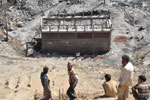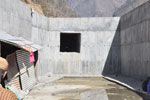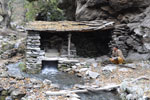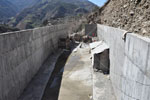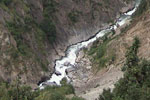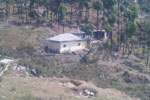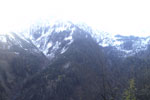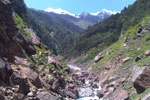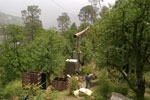Himachal Pradesh is endowed with about 21000 MW of exploitable hydro potential, excluding about 1200 MW in small /mini/micro hydel potential, in its five river basins. Being environment friendly source of energy, Govt of India /Govt of Himachal Pradesh has encouraged participation of private sector in a big way, with renewed set of incentives for its exploitation.
Govt. of Himachal Pradesh has entrusted the task of implementation of self identified BANU Small Hydroelectric Project to M/S Jaya Enterprises, Shimla in the private sector on Build, Own, and Operate and Maintain (BOOM) basis.
PROJECT Proposed Banu Small Hydroelectric project is a run – of – the river type development on Banu Nalla, a tributary of Parai khad which in turn is a tributary of Beas river in District Kangra of Himachal Pradesh. The scheme envisages diversion of Banu khad inflows by constructing a diversion weir. The diverted inflows will be carried through conveyance tunnel to a surface desilting tank, which will be designed to exclude all silt particles down to 0.20 mm size. The silt free water will be carried through open channel to a surface forebay. The inflows will be lead to surface power house through a surface penstock to feed two no’s pelton turbine driven generating units of 2.5 MW each.
The proposed Banu Small Hydel Project is an upstream development of the Binwa HEP developed by Himachal Pradesh State Electricity Board. There is no project on the upstream of this scheme allotted so far and no scheme is a feasible one above this scheme. The scheme does not interfere with any other schemes of HIMURJA/HPSEB.
Himachal Pradesh is located in the Western portion of the Great Himalayan Mountain range of Northern India., bounded by the state of J&K to the North, Tibet to the East and plains of North India to the South and West. State Highway connect Chamba (District head quarter) from Shimla (State Capital). Dharamshala is one of the important towns of the Himachal Pradesh and is well connected to Chandigarh and Pathankot. The site can be approached from Baijnath /Paprola up to intake site of Binwa HEP of HPSEB. A road to village Binwa nagar near the diversion site of the proposed scheme is under construction under Pradhan Mantri Gram Sadak Yojna (PMSGY). A link road shall be constructed to approach the proposed power house site. The diversion site is near village Manei and proposed power house site is on the left bank of Banu khad just upstream of intake of Binwa HEP of HPSEB. The location plan of the project is shown in drawing Banu – 03.
Climate / Precipitation
The climate of this basin is harsh and cold during winter and is pleasant during summer season. The catchment receives rainfall from south West monsoon and snowfall in winter due to Westerly disturbances. Normal annual rainfall/snowfall in the region is 1600-24000 mm. The temperature falls to -0 degrees C during winter and rises to 30 degrees C during the summer.
Water availability
In flows of Neogal khad has been gauged for, and the same have been be used to access the water availability of Banu SHP at Diversion site.
Power generation
The power generation during 75% dependable year has been worked out 28.58 MU. After allowing 1.0 % power to be consumed in auxiliaries & transformation losses, 2% power as transmission losses, 5% for outages in the transmission system and 12% free power to state government as royalty from thirteenth year after Implementation Agreement the net saleable energy available is estimated at 26.29 MU in first 12 years and 23.14 MU after 12 years of operation.
Project structures
The civil engineering structures proposed for this project are discussed as follows:
Diversion weir
For diversion of Banu Khad inflows, drop type trench weir is proposed at E1± 1998 m. The length of the diversion weir is 15 m to draw a discharge of 2.44 cumecs including discharge required for shingle flushing system and flushing at desilting tank. Shingle flushing pipe will be provided at collection chamber to flush the shingle back into khad.
Desilting Arrangement.
A surface desilting tank is proposed downstream of diversion weir. The desilting tank will be designed to exclude all silt particles down to 0.20 mm size. The desilting tank will comprise one chamber of size 30 m x 3.5 m x 3 m deep with central silt gutter type silt flushing system.
Water conductor system
For carrying the inflows from desilting tank to forebay a 600 m long head race tunnel of 1.8 m D-shaped and thereafter an open channel 1.2 x 1.2 m size cut and cover is proposed. The length of power channel shall be ± 900 m. The power channel will carry design discharge of 1.63 cumec at 1.38 m/sec velocity with a bed slope of 1:600.
Forebay
At the end of power channel, a surface forebay will be provided to cater for the sudden acceptance/rejection of load. The capacity of forebay will be ± 293 cum to provide peaking/balancing storage for ± 3 minutes. The size of forebay has been proposed at 30 m x 5 m x 4.00 m rectangular and it will be provided with suitable spilling arrangement.
Penstock
The water from forebay will be led to power house through a surface penstock of ± 1000 mm diameter. The penstock pipe will be fabricated from high tension steel plates with welded joints with plate thickness varying from 8 mm to 22 mm. Suitable saddle supports and anchor blocks shall be provided to support the penstock pipe. The penstock pipe will carry the design discharge of 1.63 cumecs at 2 m/sec velocity. Suitable inlet gate will be provided to regulate the flow to power house. The length of main penstock will be ± 724 m, which will bifurcate near power house into two branch penstocks of 750 mm diameter to feed two turbines.
Power house
A surface power house is proposed on left bank of Banu khad with normal tail water level at E1 + 1599 m. The power house will house two nos, horizontal axis pelton turbines driven generating units of 2.5 MW each. The outflow from turbine shall be led through a tail race channel of size 1.2 m x 1.50 m to Banu khad. A switch yard is proposed near the power house.
The power generated from this project will be fed into Binwa Sub Station of Himachal Pradesh State Electricity Board.
COST ESTIMATE
The estimated cost of this project at March – 2009 price level has tentatively been worked out at Rs 3247.53 lac comprising Rs 2256.49 lac for civil works, Rs. 899.94 lac for generating plant and equipment and Rs. 90.78 lac for transmission line and associated transmission network. The interest during construction (IDC), and LADC has been worked out to Rs. 337.06 and Rs 36.11 lac respectively. The total cost of project including IDC, FC and LADC has been worked out at Rs. 3646.72 lac.
FINANCIAL ASPECTS
The financial forecast of project has been worked out considering cost of project and energy available for sale. Annual working expenses has been worked out @ 16.67% of project cost comprising to 11% interest, 3.17% depreciation, 1.5% O & M, 1% general reserve /other miscellaneous expenses. The levelised tariff has accordingly been worked out at Rs. 2.12 per kwh respectively. The sale rate of energy to HPSEB is Rs. 2.87 per kwh and this makes this scheme economically attractive. Though in initial years returns from the project are not good but the benefits from Carbon Credits through Clean Development Mechanism shall make this scheme viable

